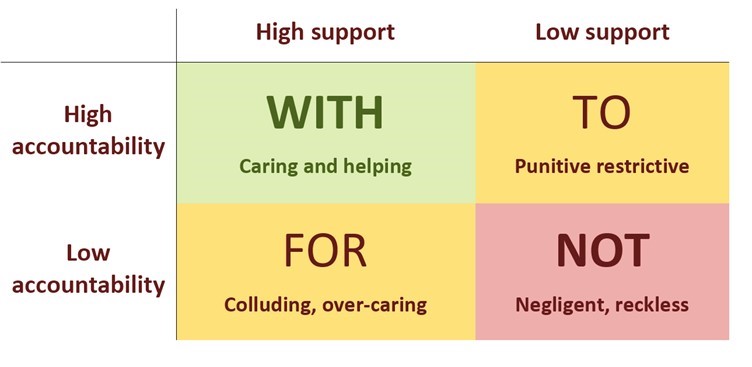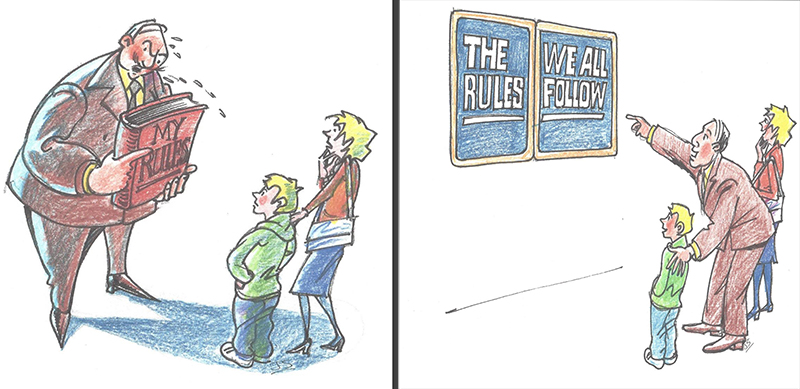This Good Relationships and Behaviour Policy describes how schools promote learning by providing and maintaining social harmony, teaching children to not do social harm, and supporting children to develop social and community skills, social well-being, readiness for learning, and good conduct.
- You can configure this Policy for use in your school.
- A complete methodology enabling schools to focus on nurturing strong relationships with all children.
- Tried and tested over more than a decade in a school for children with complex social and emotional needs.
- Free to use for non-commercial purposes.
- The implementation of this policy is supported by the Staff Handbook and Training Manual.
This policy provides clear guidance for the whole school community in providing and maintaining a non-coercive ethos.
Using restorative approaches, and dialogue and narrative skills, we develop in our students a better understanding of themselves and their relationships, which enables them to take responsibility for their good conduct and be ready and willing to engage fully in learning.
It also describes how we promote learning by providing and maintaining social harmony, teaching children to not do social harm, and supporting children to develop social and community skills.
Statute and scope
This policy complies with the Equality Act 2010, the School Standards and Framework Act 1988 and The Education and Inspections Act 2006 by describing for the whole school community how the school promotes self-discipline and proper regard for authority, encourages good behaviour and respect for others and prevents all forms of bullying.
It applies to all the school’s activities in conjunction with the aims and requirements of the following policies: [amend as necessary]
We ask families and carers to support their children to
- Carry out reasonable requests made by staff
- Accept support from staff and allow them to keep you safe
- Listen when staff need to talk to you
- Speak truthfully
- Treat others with equal respect
- Care for the school community and environment
- Participate in class activities and stick to any personalised plan
The school community is committed to
- Welcome you into the school community
- Treat you with respect
- Keep you safe
- Support you to achieve your potential
- Meet your needs if we can
- Listen to you if you need to talk to us
- Speak to you truthfully, kindly and considerately
The most effective way to develop and increase positive motivation in students is to use non-coercive approaches because motivation is, fundamentally, a voluntary process. If we are forced to do something, when the force is removed we are likely to stop.
Children form positive relationships much more easily with adults who are as non-coercive as possible. Strong and trusting relationships are a most advantageous thing, rich in positive shared memories and mutual understanding.
Children (and adults) are more co-operative with those they like and will even do things they don’t want to do, to please someone they trust and respect. When the relationship is good, so is communication.
It’s easier to say ‘hard things’ in a good relationship and so change becomes easier.
We want children to feel they belong to the school community, value it, and are valued by it.
We use restorative intervention combined with responsive planning instead of sanctions to ensure that students are able to manage their own behaviour. We consider restorative responses to be more challenging to wrong-doers and more productive than punishment.
Family carer and community engagement
We believe parents and carers are key partners in supporting their children and the school community to achieve its aspirations for their children. We maintain good communications with parents and carers. We inform them whenever there are significant or prolonged conduct issues. We collaborate with parents and carers in guiding and supporting their children to participate and engage positively in school-life and learning. We may call or text parents and carers, invite them to a meeting, or request a home visit.
Supporting staff
We provide training and professional development for staff so that they can apply this policy consistently and effectively as part of the whole school community. We support staff to nurture and develop positive relationships with children who do not have good relationships skills, find it hard to trust or talk to adults, or are very anxious and insecure.
The school community - roles and responsibilities
The school community comprises children and their families, the staff team including senior leaders, and the school’s governing body.
Every member of the staff team is expected to understand the principles of this policy and ensure all their practice remains within our ethos. Our staff team works
collaboratively, We value and appreciate the perspectives and observations of every staff member and take these into account.
Home-school agreements
We ask parents and children to sign a home-school agreement annually to confirm their commitment to upholding our school charter and helping their child do so. From time to time the school may invite parents to discuss and agree a specific home-school agreement to support ...
Beyond the school gate
This policy also applies when children are in school uniform outside the school, or taki...
The ‘conduct curriculum’ describes the social, communications, personal development, and relationship competencies which children develop during their school-life. When there are conduct issues, it is because the child has not yet learned, or cannot access, these competencies at that time.
We use the conduct curriculum to assess needs and select development objectives which will help them participate positively in school-life and learning.
The conduct curriculum overlaps the Personal Social and Health Education and the Spiritual Moral, Social and Cultural curriculums (including British Values). But the conduct curriculum focuses more on the child’s adaptive skills and competencies.
We use a range of different frameworks for this such as the Boxall Profile, the Vineland Adaptive Behaviour Scales, and the 7-factor relationship model.
A relationship forms when one person co-operates with another. Because it is the most rewarding and effective survival strategy, humans have evolved to pursue personal benefit through co-operative activity. As a result: -
- We are motivated to meet the needs of others
- We are motivated to communicate
- We are motivated to make agreements
These sociability traits have enabled us to proliferate across the planet. Co-operation can best be defined as “mutually meeting one’s own needs by helping another to meet their needs” Through Dialogue we make Agreements, and if these are kept, Trust grows. Increased trust supports more elaborate agreements, of many types.
Each person maintains their own recollection of the outcomes of the raft of agreements made, kept or unkept, and the events and dialogues which went with them. This narrative account (the ‘story’ of the relationship) forms the basis for our thinking, actions and decisions.
Relationships flourish when both participants believe that their involvement is their free choice, that the ‘cost-benefits’ to each of them is fair, and that there is give-and-take in all aspects of the relationship. We refer to these factors as Free Agency, Equity, Reciprocity.
This is why a non-coercive ethos is essential. Unless we are free to choose, how can we ensure the agreement is fair?
Staff are trained to engage children in equitable dialogue and make agreements with them to address any issues, and we teach children the co-operative skills they need to engage in school-life and learning as part of the conduct curriculum.
Readiness for learning
Children are motivated to learn when their basic needs for physical and mental well-being have been met.
Inevitably, some children experience adverse life events such as bereavement, chronic poverty, having sibling- or parent-care responsibilities, family breakdown, homelessness, and other disturbing crises. This can mean children may arrive at school underfed, over-tired, stressed and anxious. These issues are often chronic.
We recognise that learning is a self-actualizing activity, as described by Maslow’s hierarchy of needs. A child’s basic needs for nourishment, emotional security and acceptance may be overwhelming, and they are not ready to attend and learn.
Our school will provide additional support with learning while endeavouring to meet these needs and will seek the help of other agencies to address the issues where appropriate.
Relationship skills
We recognise the power of strong trusting relationships in making children feel secure, valued and engaged. We want all our children feel they belong. A sense of belonging is reinforced when a child can contribute into the group by meeting group needs as well as by having its needs met by the group.
We also recognise that children have to learn social and relationship skills. We teach them by modelling them. We help children to:
- Experience a sense of ‘supported choosing’ as much as possible within our limits
- Have the reasons and benefits of what they are asked to do explained
- Take responsibility for being in control of themselves
- Be given reasons to trust and to see trust in them demonstrated
- Be given valid and honest explanations
- Feel fully valued and involved
- Make and keep agreements
- Appreciate and nurture their own narratives.
Staff use the ‘high-support with high-accountability’ approach. We see this as doing things with the child, not to them or for them. Tariff-based sanctions are often ineffective with difficult cases because it drives the school ever further into the top right sector of the diagram.

School rules are essential to the well-being of the school community and contribute to a sense of identity and self-respect. They may also relate to health, safety, or environment needs.
In addition to our school Charter we also ask children to keep our school rules about uniform, mobile phones, and similar matters (see page21). We update the school rules whenever necessary to improve our school ethos.
In keeping with our non-coercive ethos, all staff adopt a supportive role when applying them. We see rules as applying to both the rule-breaker and the rule-applier. For instance, if the rules state that a pupil must not leave school premises then it also states implicitly that a teacher must act to prevent this happening.

In effect, it is the whole school community which ‘own’ the rules, rather than individual staff members, and we stand with the children in complying with them.
For the full text of Part Two download the policy.
- Restorative responses
- Language and Communications
- Day-to-day conduct management in and out of class
- When a personalised support plan is needed
- Bullying and E-safety
- When children have not completed their work
- When we need to intervene assertively
- Attendance
- Exclusion and managed moves
- Use of reasonable force
- Searching children and confiscating property
- Assessing needs and school effectiveness
- Recording and monitoring conduct
- Evaluating the narrative
- How this policy is reviewed
